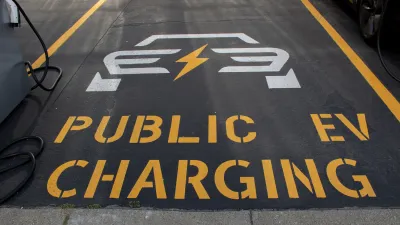Recent data shows that workers need cars to access jobs and economic opportunity. What can planners do to expand access to jobs via other alternative modes of transportation?
Adie Tomer and Joseph Kane address the ongoing question of the role of the automobile in enabling—or obstructing—economic opportunity by citing recent data from the 2013 Census showing that workers who don't own cars are driving more. That is, "zero-vehicle workers still do quite a bit of driving. Over 20 percent drive alone to work—meaning they find a private car to borrow—and another 12 percent commute via carpool. Both rates jumped between 2007 and 2013, defying national trends toward less driving."
Tomer and Kane use the new data to make a case for providing alternative forms of access to jobs: "To address this inequity, we need to shift how we plan transportation investments and urban development. Planners and engineers need to think less about mobility—how fast we move—and more about access—how many destinations we can reach."
FULL STORY: Cars Remain King and Barrier to Economic Opportunity

Planetizen Federal Action Tracker
A weekly monitor of how Trump’s orders and actions are impacting planners and planning in America.

Maui's Vacation Rental Debate Turns Ugly
Verbal attacks, misinformation campaigns and fistfights plague a high-stakes debate to convert thousands of vacation rentals into long-term housing.

Restaurant Patios Were a Pandemic Win — Why Were They so Hard to Keep?
Social distancing requirements and changes in travel patterns prompted cities to pilot new uses for street and sidewalk space. Then it got complicated.

In California Battle of Housing vs. Environment, Housing Just Won
A new state law significantly limits the power of CEQA, an environmental review law that served as a powerful tool for blocking new development.

Boulder Eliminates Parking Minimums Citywide
Officials estimate the cost of building a single underground parking space at up to $100,000.

Orange County, Florida Adopts Largest US “Sprawl Repair” Code
The ‘Orange Code’ seeks to rectify decades of sprawl-inducing, car-oriented development.
Urban Design for Planners 1: Software Tools
This six-course series explores essential urban design concepts using open source software and equips planners with the tools they need to participate fully in the urban design process.
Planning for Universal Design
Learn the tools for implementing Universal Design in planning regulations.
Heyer Gruel & Associates PA
JM Goldson LLC
Custer County Colorado
City of Camden Redevelopment Agency
City of Astoria
Transportation Research & Education Center (TREC) at Portland State University
Jefferson Parish Government
Camden Redevelopment Agency
City of Claremont




























